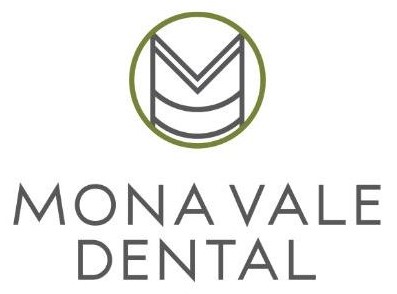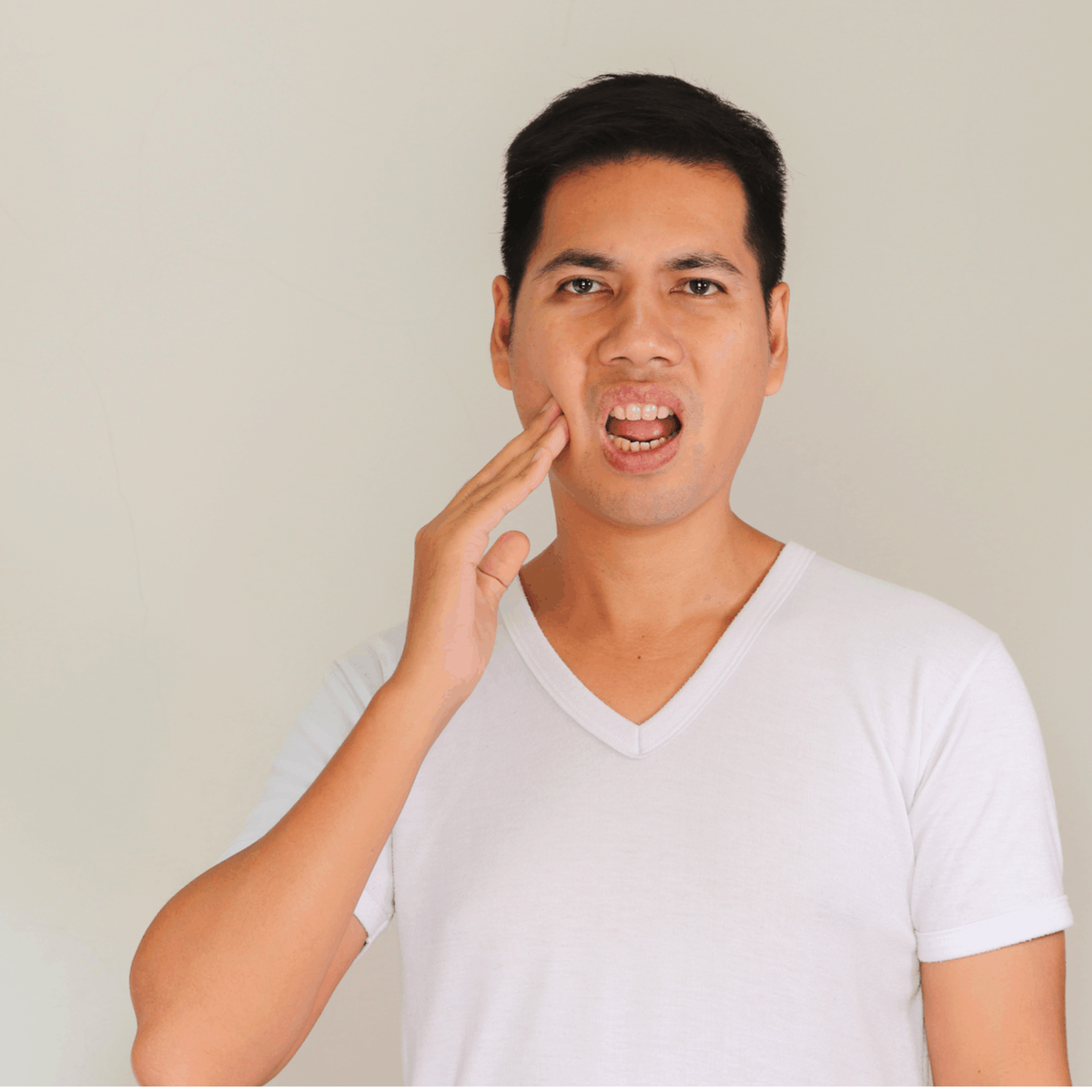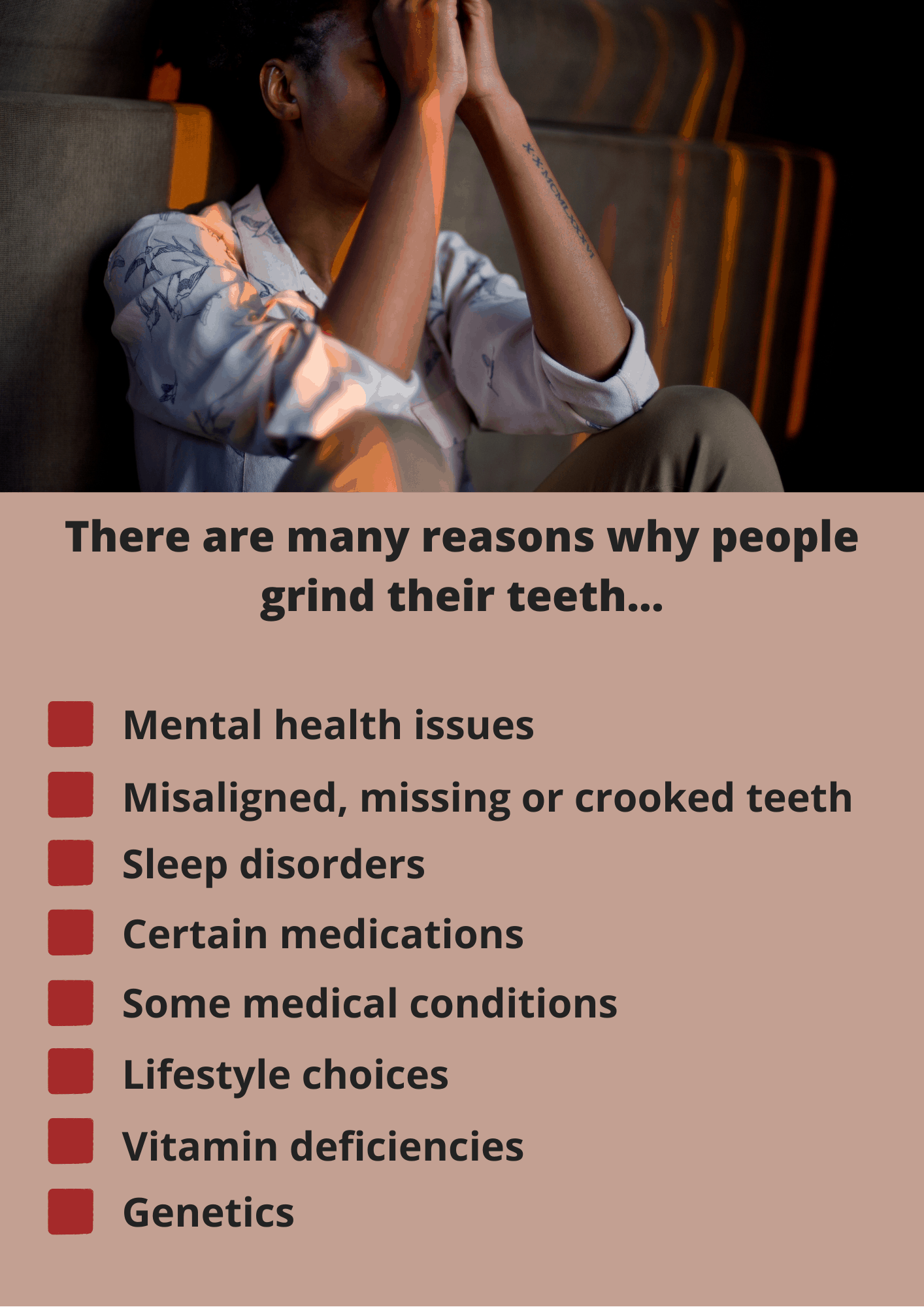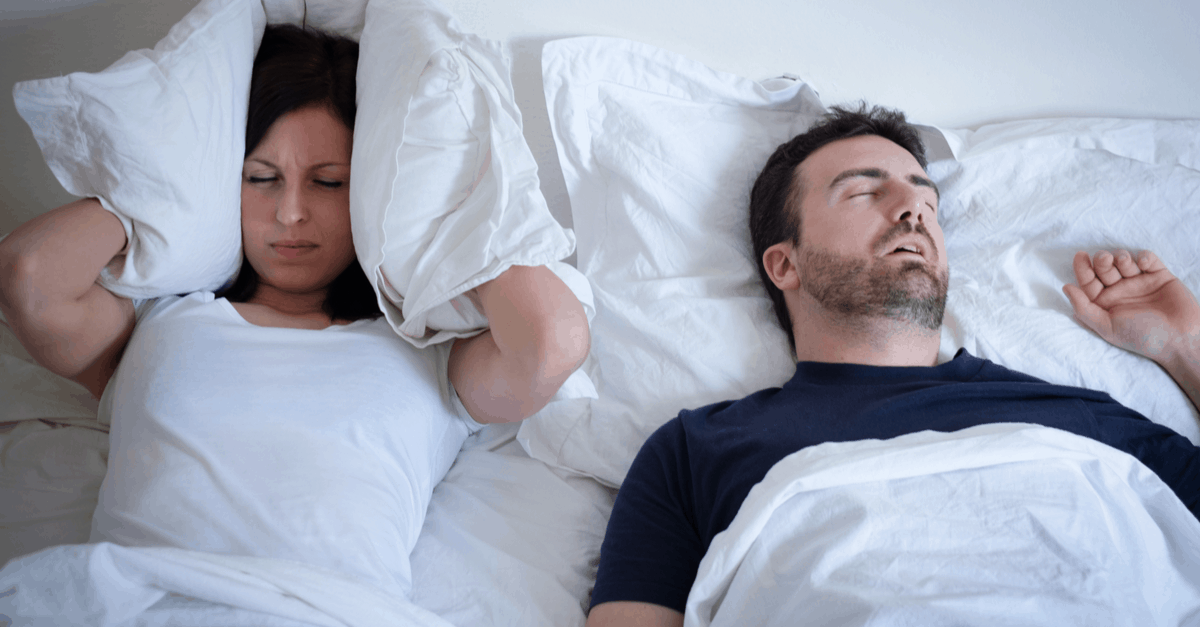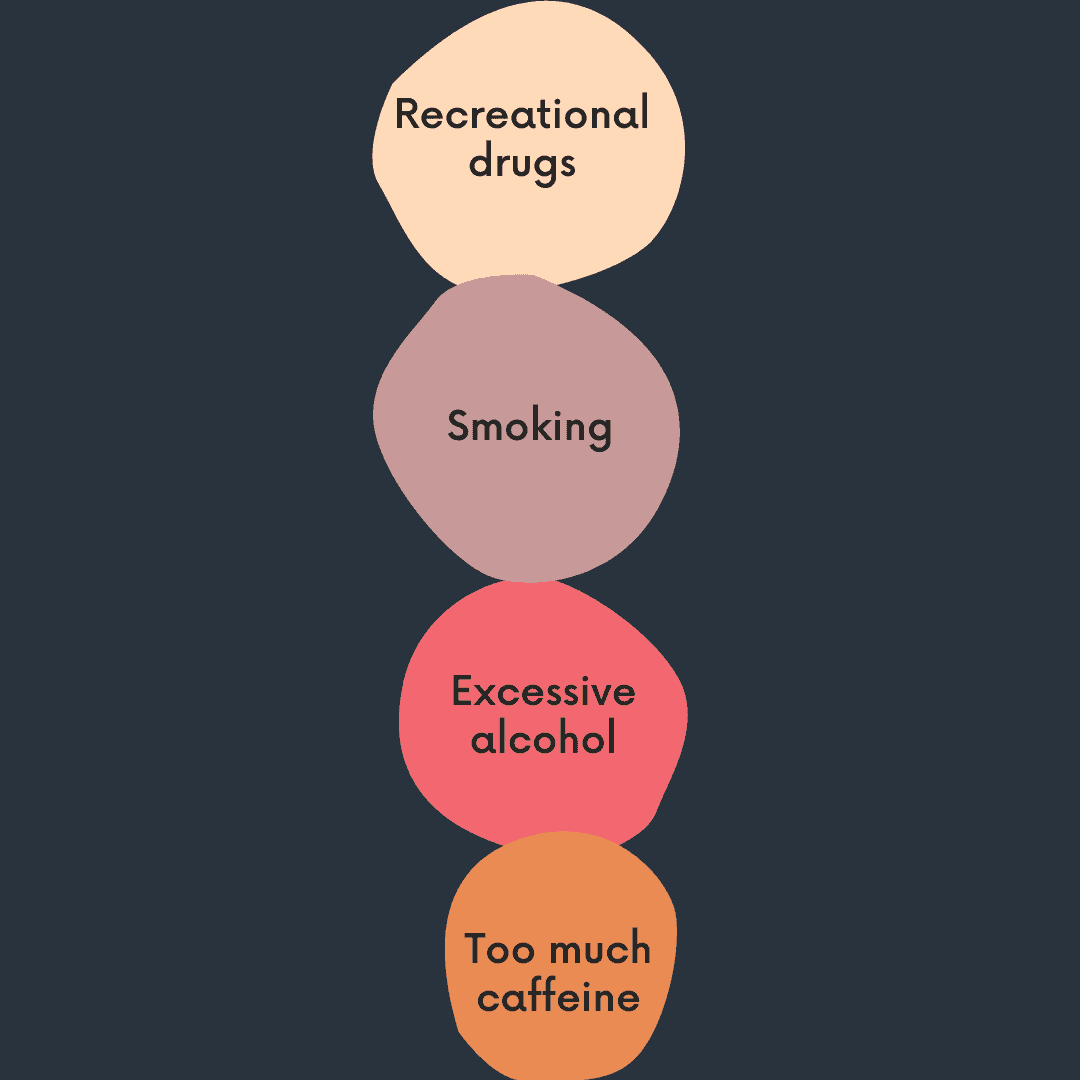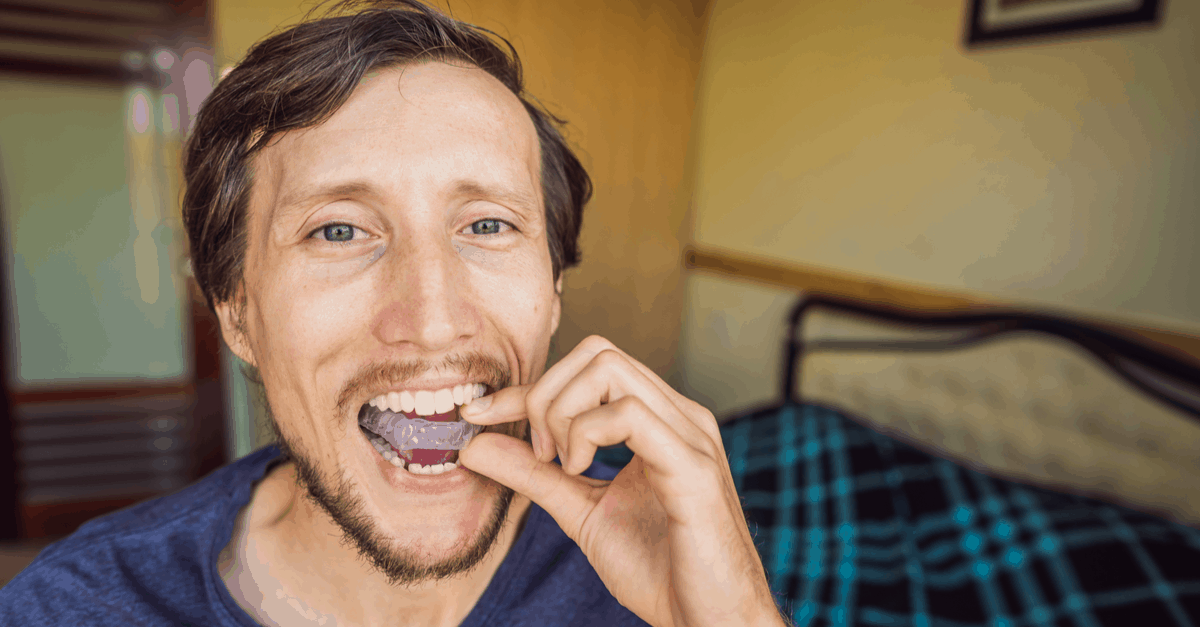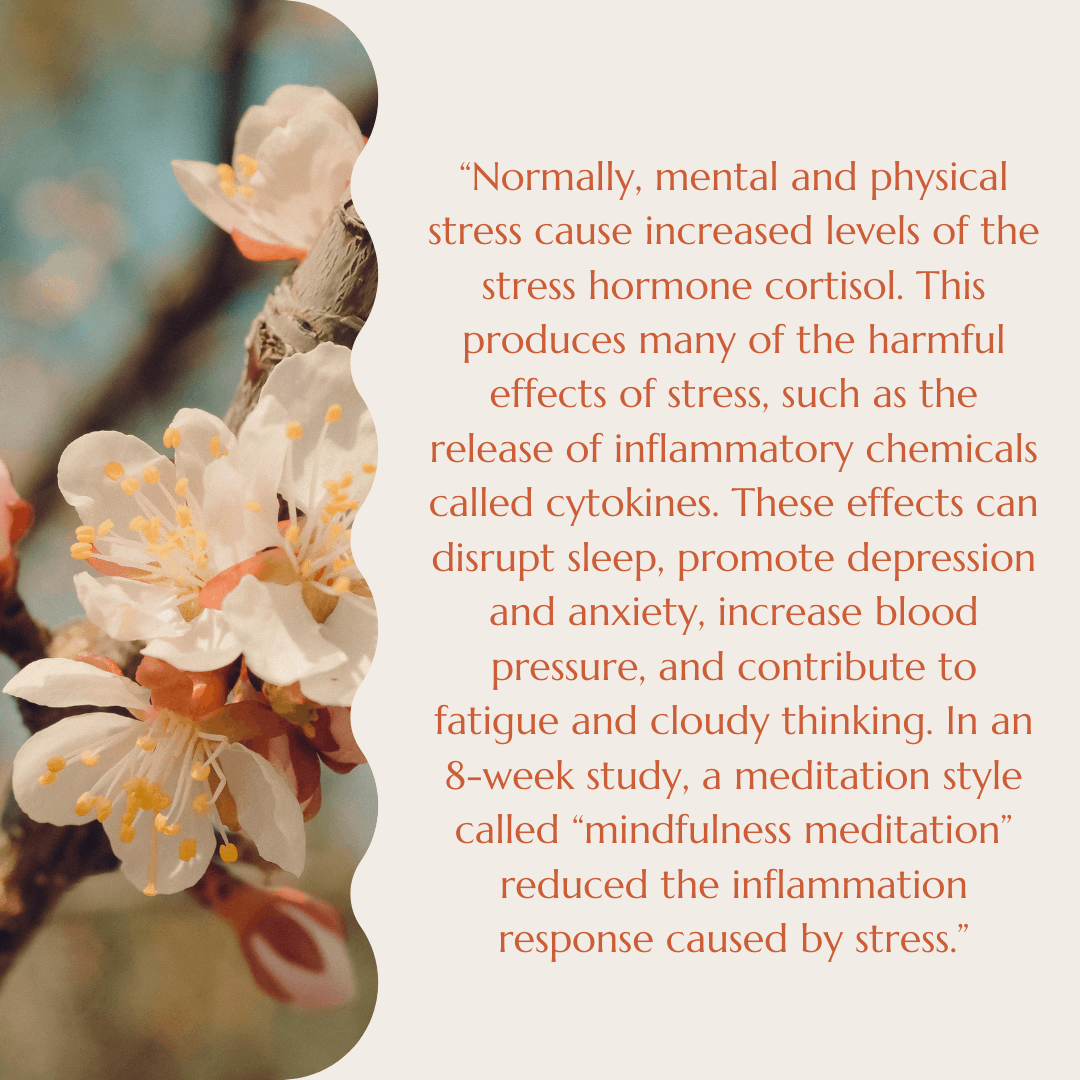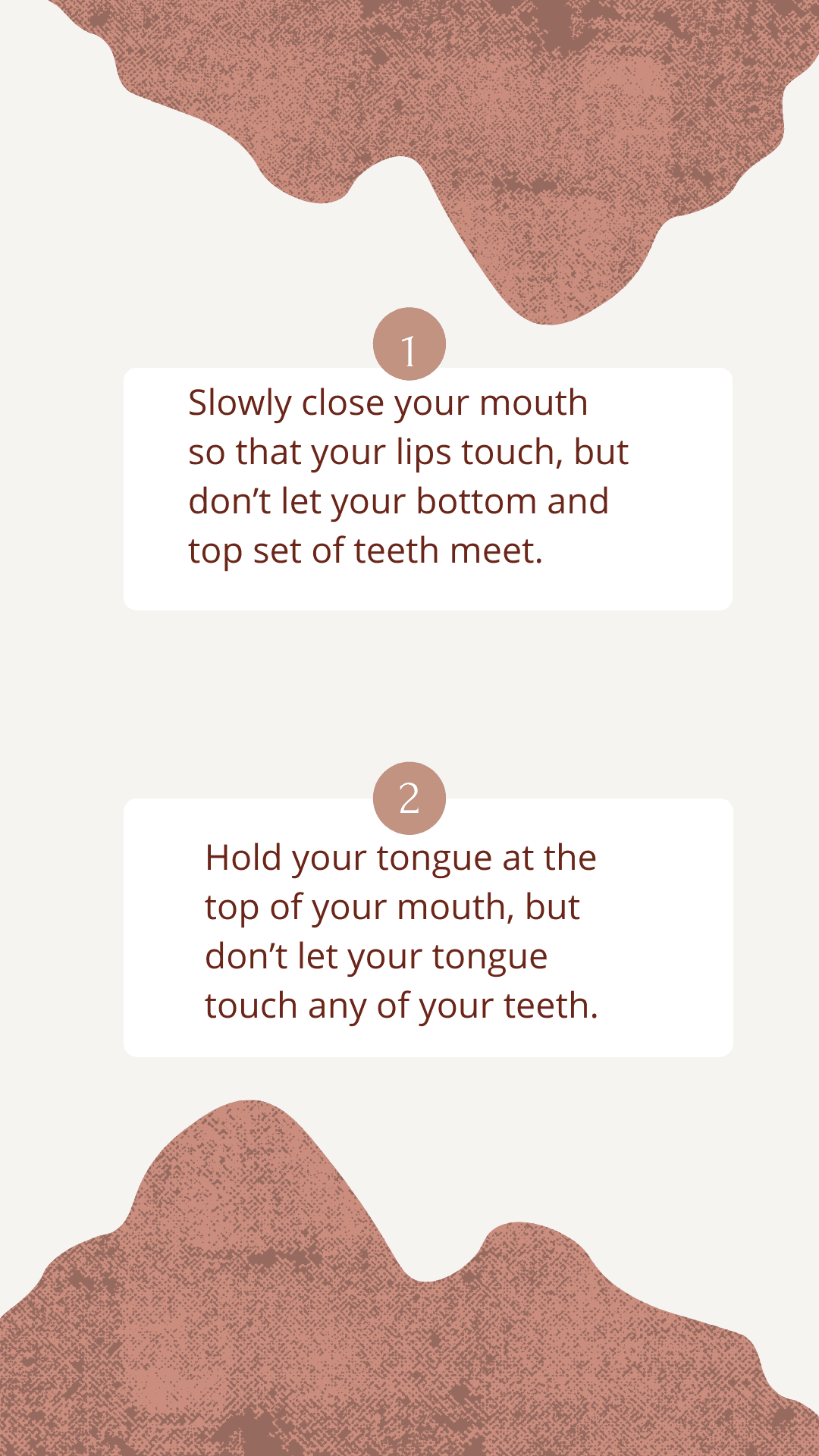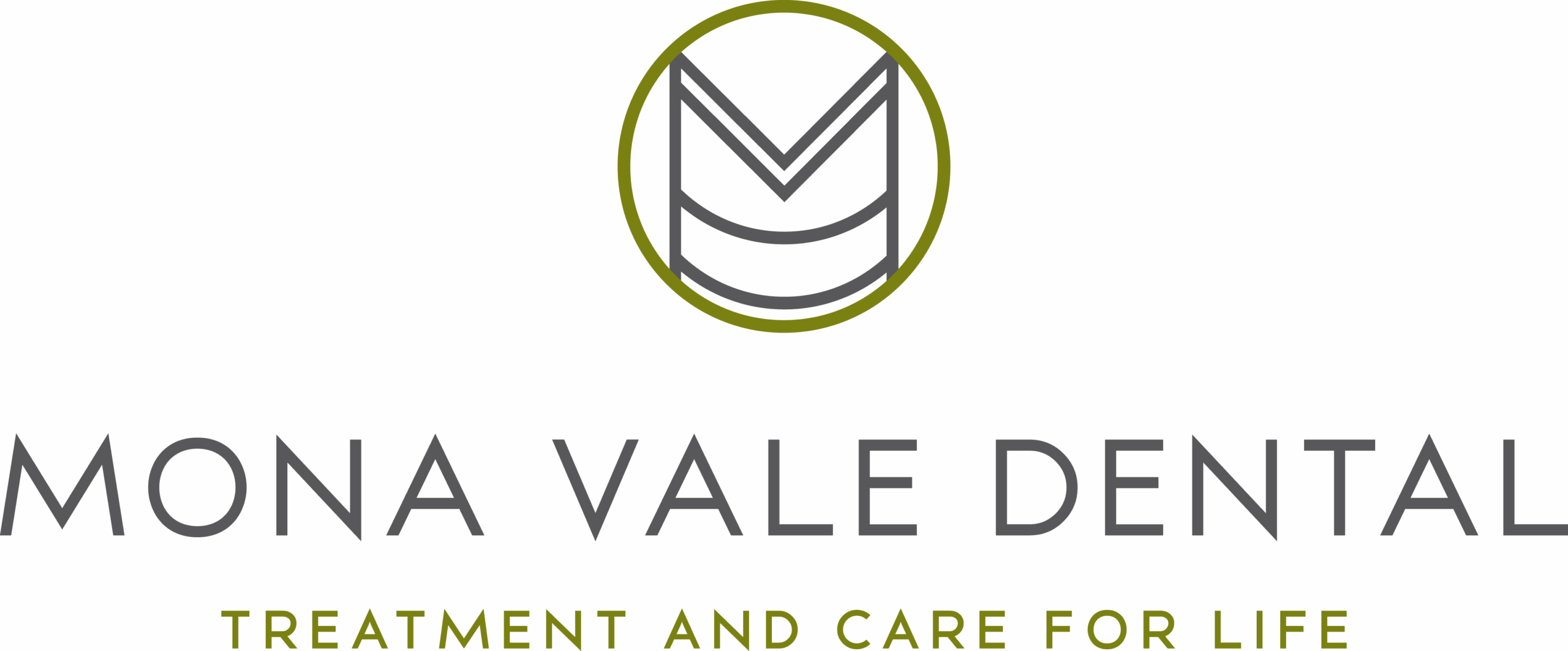If you ever clench your teeth when feeling anxious or stressed, you’re definitely in good company.
Most of us do it from time to time, without even realising.
There’s no harm in this, unless you’re one in ten people who grind their teeth on a regular basis.
Does that sound like you?
This condition is called bruxism, and left untreated it can cause all sorts of health problems, as well as cosmetic issues.
We talk about a number of strategies and therapies that can help you to effectively manage this condition (you can easily try some of these at home, after reading the article).
But first, what is teeth grinding and how do you know it’s a problem for you?
What is bruxism?
Teeth grinding happens involuntarily, when teeth rub together with enough pressure to forcefully move the jaw back and forth or from one side to the other.
Teeth clenching is similar, but doesn’t involve movement of the teeth (just clenching, which in turn causes muscle tension).
People of all ages are affected by two forms of teeth grinding:
- Nocturnal bruxism – occurs when sleeping (most common)
- Awake bruxism – occurs during the day (less common)
To give you an idea of the powerful forces involved:
The usual protective neuromuscular reflexes that operate during the day appear to be less effective at night, so there’s more pressure on teeth while sleeping.
This pressure is less tolerated than the pressures associated with regular chewing, according to a study in the Journal of Conservative Dentistry. The body’s masticatory and restorative systems struggle with the heavy horizontal forces of grinding, as opposed to the predominantly vertical forces that occur when chewing food or swallowing saliva.
In other words, it’s a heavy burden for the teeth to take!
Bruxism complications
- Headaches or migraines
- Teeth look worn down or flatter
- Broken teeth
- Tooth sensitivity due to enamel erosion
- Cracks, damages or fractures in teeth
- Loss of teeth
- Pain or discomfort in face, jaw and ears
- Mysterious cracks or breakages in fillings and crowns
Long-term complications:
- Teeth worn down to stumps
- Changes in facial appearance (muscles appear larger)
- Chronic ear pain
- Severe migraines
- Temporomandibular joint disorders (TMJ)
Did you know there may even be a link between tooth grinding and stomach ulcers in some cases?
Mariela Padilla is an associate professor of clinical dentistry at the University of Southern California Herman Ostrow School of Dentistry.
She says our bodies may interpret tooth grinding as chewing and begin releasing gastric acids in anticipation of food that isn’t coming – which is problematic.
“Since there’s no food involved in tooth grinding, Padilla says triggering acid can potentially lead to ulcers, which could be one reason why individuals experiencing chronic stress also have digestive concerns.” Elemental Medium article
Signs you may have a problem (teeth grinding symptoms)
Bruxism is notoriously difficult for people to detect, because it mostly occurs while sleeping.
However there are some tell-tale signs, if you know what to look out for.
Do you usually have a headache or sore jaw upon rising in the morning (but not at other times of the day)? There’s a good chance this is because you’ve been grinding your teeth.
Here are some other clues:
- Your partner complains that your teeth make loud sounds at night
- Chipped or fractured teeth with no obvious cause (such as an accident)
- Headaches start at your temples
- Sleep is disrupted
- Teeth look worn down and feel sensitive
- Jaw muscles feel tense or tired
- Limited range of motion when opening or closing your jaw (locked jaw)
Your dentist will examine your mouth for any signs of bruxism when you visit, which is why regular appointments are so crucial.
If there’s any reason to believe you’ve been grinding your teeth, they will monitor your mouth over a few visits to see if this is an ongoing problem, and to determine the best treatment options.
You will be asked questions about sleep patterns, exercise habits, general health and medications – as teeth grinding can sometimes be caused by underlying conditions. Your dentist will refer you to an appropriate specialist for further testing, if this is suspected.
What causes bruxism?
Before we talk about treatment options; it’s important to understand there isn’t a one-size-fits-all solution, because there isn’t a singular cause for bruxism.
We often associate tooth grinding with images of tense people – and rightly so – given that 70 per cent of cases are triggered by stress and anxiety.
However, this isn’t always the case.
Let’s look at these in more detail…
Stress and anxiety:
Our bodies produce more adrenaline and cortisol when we’re stressed. This can lead to physical reactions that are beyond our conscious control, such as clenching teeth.
One study of 99 patients with temporomandibular disorder found that bruxism patients reported far higher anxiety and depression levels than patients without bruxism.
This isn’t an isolated finding either.
Another example: a Finnish study analysed levels of self-reported bruxism and anxiety in media workers.
The results show that people who frequently grind their teeth were twice as likely to have severe stress and anxiety, compared to their peers who don’t have bruxism, or only occasionally grind their teeth.
“Among the 874 respondents, those aware of more frequent bruxism reported significantly more severe anxiety (p<0.001). Adjusted by age and gender, frequent bruxers were more than two times more likely to report severe stress (odds ratio 2.5; 95% confidence interval 1.5-4.2) and anxiety (odds ratio 2.2; 95% confidence interval 1.3-3.6) than non-or-mild bruxers. Conclusions: Present findings suggest that self-reported bruxism and psychological states such as anxiety or stress may be related in working age subjects.” Report: self-reported bruxism mirrors anxiety and stress in adults
Perhaps unsurprisingly, more people are experiencing bruxism during the global health pandemic.
A questionnaire of 1,800 participants found the prevalence of “awake bruxism” increased from 17 to 32 per cent, while “nocturnal bruxism” jumped from 10 to 36 per cent. This is most likely due to heightened health and financial concerns during this particularly stressful period.
Misaligned jaw or crooked teeth:
Bruxism can be caused by misalignment between the upper and lower set of teeth (this is called malocclusion).
Discrepancies between the lower and upper jaw can put extra pressure on teeth when they rub together.
Sleep disorders:
People who clench or grind their teeth while sleeping might suffer from obstructive sleep apnoea (OSA), or a similar disorder.
The risk of sleep bruxism is significantly higher in patients who have OSA, according to this study.
Why does this connection exist?
Scientists don’t know for sure, but one theory is that teeth grinding may help to moisten throat tissue that becomes dry as a result of obstructed breathing.
A similar hypothesis is that the involuntary movement of muscles in the mouth may help to reopen airways that have become constricted (in other words, bruxism is a protective response to sleep apnoea).
Vitamin deficiencies:
It’s possible that “bruxers” aren’t getting enough vitamin D, magnesium or calcium. These vitamin deficiencies have been linked to teeth grinding, as well as poor mental health.
“Participants with sleep bruxism had lower 25-hydroxyvitamin D and higher scores of anxiety and depression compared to controls (p < 0.05). Vitamin D deficiency, abnormal scores of anxiety and depression, low calcium consumption (< 323 mg/day), and frequent headache were reported in higher % of individuals with sleep bruxism compared to controls (p < 0.05).” BMC Oral Health 2021
Medical conditions:
Teeth grinding can be a sign of an underlying medical condition that hasn’t been diagnosed, or the side-effect of a condition that has already been diagnosed.
- Parkinson’s disease
- Huntington’s disease
- Dementia
- Gastroesophageal reflux disorder (GERD)
- ADHD
- Epilepsy
- Cerebral Palsy
- Down Syndrome
- Fibromyalgia
- Endocrine disorders (such as Addison’s disease, Graves’ disease and Cushing’s syndrome)
- Night terrors and sleep disorders
- Autism
- Brain injury
- Depression
- Pinworm infection
- Allergies
- Obsessive-compulsive disorder (OCD)
In some cases, certain prescription drugs may even cause or worsen bruxism, by stimulating neurotransmitters in the brain. Examples include Prozac, Bupropion, Zoloft, Celexa, Adderall and Rasagiline medications.
If you suspect there’s a link between your medication and bruxism, speak with your doctor to see if it’s possible to decrease the dosage or switch to an alternative medication.
Lifestyle choices:
Activities that stimulate the central nervous system significantly increase your chances of developing sleep bruxism.
This includes taking recreational drugs like cocaine or ecstasy. Smoking is a common culprit too: tobacco smokers are three times more likely to experience bruxism symptoms than non-smokers.
Although there’s nothing wrong with enjoying a glass or two of wine; excessive alcohol consumption can interfere with sleeping patterns and therefore increase the risk of bruxism.
The same logic applies to caffeine, which stimulates muscle activity at night and interferes with sleep patterns. It’s best not to have more than 400 mg of coffee, tea, soda and energy drinks a day (even less is better).
Causes of teeth grinding in children
Teeth grinding occurs in 15 to 33 per cent of children – typically in two stages:
- After the development of baby teeth
- During the development of permanent teeth
Thankfully this grinding habit is usually temporary and disappears after all adult teeth have developed.
In cases where bruxism continues, the causes are usually similar to adults: misaligned teeth (most common for teens), stress, underlying health conditions or allergies.
Bruxism treatment and exercises
If you or your child suffer from bruxism, please don’t feel disheartened.
There’s likely to be a solution – and you may even see positive results faster than expected!
The first step is to visit your dentist for a diagnosis that also explores the underlying cause – as this will make the treatment more targeted and effective.
Treatment plans usually involve lifestyle changes to reduce stress, and you can try some techniques from the comfort of your home. Often this is enough to stop or significantly reduce the grinding, so nothing else is required.
However, if this doesn’t work for you, there are other solutions we can explore, such as dental treatments.
Let’s look at some of the options:
- Meditative activities
- Emotional therapy
- Healthy eating and addressing vitamin deficiencies
- General exercise
- Biofeedback therapy
- Exercising your tongue and jaw muscles
- Mouthguards (OTC and custom)
- Orthodontic treatment
- Reductive coronoplasty dental procedure
- Botox
Reduce stress and improve sleep quality:
We already know that stress is the leading cause of bruxism, by a long shot.
Regular meditation is one of the most powerful ways to lower stress, support your general health and alleviate bruxism.
It’s all about tuning into the present moment and observing any feelings or sensations that float by.
There’s no shortage of research flagging the benefits of meditation.
There are many different ways to meditate, so experiment to find a method that feels good for you.
Popular options include: guided meditation, deep breathing, Tai chi, yoga, mantra meditation, mindfulness meditation, prayer and feeling gratitude.
If you’re new to meditation, here’s a helpful resource to get you started.
And you might want to try this guided meditation specifically for bruxism and TMJ:
Emotional therapy:
If you’re feeling stressed or anxious, it’s a good idea to speak with a counsellor or psychologist. A professional can give you the tools you need to process your negative thoughts and feel calmer.
Let your doctor know that you need support and you may be eligible for Medicare rebates that cover up to 20 psychological appointments a year.
General exercise:
Any kind of exercise can help to reduce stress, by releasing feel-good endorphins.
Gentle movements that foster a state of mindfulness are particularly effective, such as walking, yoga, Qi gong and Tai chi.
You might also consider breaking a sweat with more intense activities like jogging, swimming, dancing and boxing.
Healthy eating and taking vitamins:
Don’t underestimate the power of a balanced diet for stabilising blood sugar levels and reducing stress.
We now know the state of our guts significantly impacts our state of mind. Scoffing down too many processed foods and sugars leads to gut inflammation, which can drag down our moods.
It’s important to reach for whole foods instead (such as fruits, vegetables, nuts, legumes and fermented products that are rich in probiotics). And if you have a vitamin D, B, calcium or magnesium deficiency; speak to your doctor about taking supplements.
Perhaps just as importantly: reduce or completely eliminate stimulants such as caffeine, alcohol, tobacco and recreational drugs.
A calming routine before sleep:
Bruxism is often worsened by sleep disturbances, which can be eliminated if you feel calm before you sleep.
A relaxing routine can improve your sleep patterns and therefore reduce teeth grinding.
Ideas include taking a warm bath, listening to relaxing music, meditating, drinking herbal tea, dimming lights and setting up a candle. Avoid stimulants such as alcohol, nicotine and caffeine before you sleep – and step away from electronic gadgets!
Specific exercises for your tongue and jaw muscles:
Targeted exercises can help you overcome bruxism by relaxing the muscles in your mouth. Your dentist can teach you a specific routine, but in the meantime try this simple exercise a few times every day (hold it for as long as you can after the second step):
Botox:
Botox can be injected into the muscles that cause clenching, to relax the muscles and alleviate teeth grinding. Although Botox is a low-risk procedure, it’s still a chemical, so this treatment should be administered by a doctor or dentist – and only if other options haven’t worked.
Orthodontic treatment (such as braces or Invisalign):
Is your bruxism caused by misalignment in your teeth or jaw?
You may require orthodontic dental treatment to straighten teeth and correct bone alignment.
Braces and Invisalign are the two most popular options for structural issues, but your dentist can discuss all possibilities with you.
Reductive coronoplasty is another option that may be suitable for your needs, if crowded, crooked or misaligned teeth are causing grinding problems.
This dental procedure involves creating a level biting surface on your teeth, which reduces the grinding temptation.
Mouthguards (OTC and custom):
Wearing a mouthguard at night provides a protective cushioning barrier around your teeth, which stops them from touching. This is a popular and non-invasive way to alleviate bruxism! There are two options:
- Purchase a mouthguard over the counter (choose one that’s made of soft plastic)
- Pay more for a custom-made mouthguard through your dentist (these tend to be more comfortable)
Cosmetic solutions to fix damage
Sometimes bruxism isn’t diagnosed and treated in time – leading to structural damage that needs to be mended.
Your dentist will be able to fix fractured or damaged teeth with fillings or crowns, but if these fixtures eventually become damaged by bruxism, they will need to be replaced too.
Even though it’s possible to restore damaged teeth, this can be expensive and uncomfortable.
Prevention is always the best solution, but only possible if you know you have a problem – which is difficult to detect without the help of a dentist.
Please make sure you visit your dentist regularly, to make sure any tooth grinding doesn’t go unnoticed.
For more than a decade, our experienced team at Mona Vale Dental has been helping patients from the Northern Beaches to stop grinding their teeth. Call us on (02) 9997 1100 to book an appointment or find out more.
